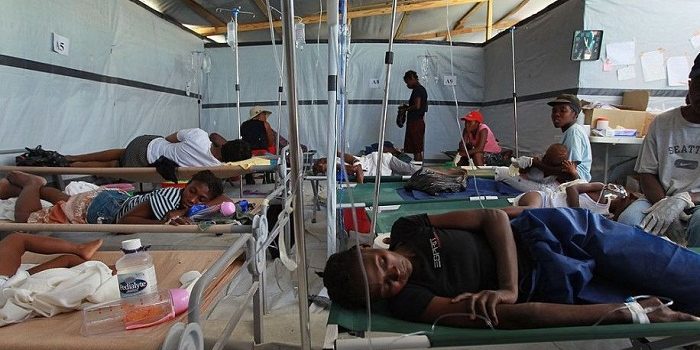Scientists race against time as Yemen’s deadly cholera outbreak spirals
YemenExtra
As Yemen’s cholera outbreak gathers pace, an investigation is under way to determine whether a new and more deadly strain of the disease is responsible for a second wave of cases that hit the country last month.
With more than 2,000 suspected cases reported daily, medical supplies are running low and in some hospitals beds are shared by up to six children. Scientists are urgently trying to identify the suspected new strain at specialist laboratories in France.
Malnutrition, lack of clean water and a conflict that has destroyed infrastructure and hampered access to medical supplies have allowed the epidemic to escalate, according to those coordinating the aid response.
“This is the second wave of cholera we have seen here recently, and it is spreading at an alarming rate,” said Nevio Zagaria, head of mission in Yemen for the World Health Organization (WHO).
Read more
United Nations (UN) and the Red Cross say Saudi is behind a cholera epidemic
Speaking from the capital, Sana’a, Zagaria said: “We had an outbreak that started in October 2016 and which declined in January. Now, in the last month, we have seen more cases in three weeks alone than in the previous six months.”
Since 27 April there have been 329 deaths and 32,056 confirmed new cases, according to the latest figures. Of those, 16% are among children under five and 20% among children aged five to 14.
“We have started an investigation to determine whether a new and more virulent strain of the cholera, perhaps originating in Somalia or Ethiopia, has been generating a higher mortality rate during this second wave of infection,” said Zagaria.
Samples have already been collected by the WHO for testing in Paris. Experts hope the results can help them understand how the disease has been spreading.
The immediate forecast is grim, however. Even by the most conservative estimates, there will be 150,000 cases of cholera within the next six months, said WHO statisticians.
Yemen has a population of almost 27 million. With food shortages and hunger spreading, the UN estimates nearly 19 million people are in need of help.
Among the most vulnerable are the undernourished. Medics on the ground said children are dying from a preventable disease because they lack supplies to treat them.
In Sana’a – the epicentre of the outbreak, with 8,000 cases – one doctor said his hospital had been receiving more than 100 suspected cases an hour.
Dr Mohammed Zaid said: “I personally received 180 cases in one day. People are left lying in the corridors and in some cases we are having to put six children in one bed.
“We are urging the international organisations to scale up their response. We are facing so many challenges: we lack medicines and medical supplies, we do not have enough doctors and nurses. We don’t even have a place to wash our hands.”
Sameera, three, is among his patients. She has four siblings but is the only one infected. Her mother said: “She likes to go outside the house and always sucks her thumb. She suddenly got sick and had severe diarrhoea and was vomiting. She has been receiving treatment for three days now and is improving.”
Cholera, an acute diarrhoeal infection, is spread through contaminated food or water but can be effectively treated with the immediate replacement of lost fluids and salts. Without treatment it can lead to death in just a few hours, even for healthy adults.
Also read
Three-quarters of people infected with the disease display no symptoms, but the pathogens remain in their faeces for seven to 14 days, meaning they can infect others. Cholera has an incubation period of between two hours and five days and can spread very quickly, especially in areas where there is overcrowding and poor sanitation.
Experts in Yemen said a shortage of trained medical staff had led to misuse of the limited supply of intravenous fluids. Amid the political upheaval and violence, health workers already on extremely low salaries are no longer being paid.
With the capital under rebel control since February 2015, the government has moved to the southern port city of Aden. Since March 2015, Saudi Arabia has led a US-backed military intervention aimed at reinstating the ousted president, Abd-Rabbu Mansour Hadi, and countering the advances of the Iran-backed Houthi forces.
Read More
“Medical professionals haven’t been paid for months,” said Mark Kaye, a humanitarian adviser for Save the Children. “What we are seeing now in Yemen is a manmade disaster. As well as the latest outbreak of cholera potentially belonging to a more aggressive strain, there is a lack of systems in place to deal with the crisis.
“Facilities are being destroyed or damaged due to fighting. We can provide support on the frontline, but it’s merely a sticking plaster. Only once there is a peace process can we get aid to the sick and hungry and start to rebuild theinstitutions that have been damaged or destroyed.”
Guardian

